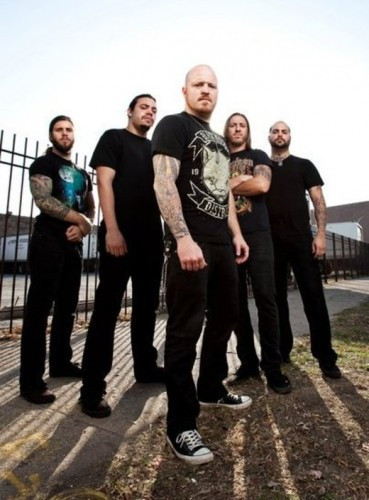
(Andy Synn returns with another SYNN REPORT, comprehensively reviewing the discography of Pennsylvania’s War of Ages.)
Recommended For Fans Of: Unearth, Nightrage, Protest The Hero
Metalcore really has become a dirty word in these uncertain times. Although we’ve seen a whole host of new pseudo-sub-genres appear out of the woodwork to take the (often well deserved) hatred of the metal people, there are those who continue to use the word “metalcore” as an insult. So what exactly is it that War Of Ages, undeniably a metalcore band in style if not always in substance, have to offer that makes it worth giving them a shot?
Well, primarily the sheer love of excessive fret-board twisting guitar work is the primary argument for their continued relevance and for my own continued enjoyment of their well-refined formula. Indeed, the group seem keen on raising the art of the impromptu and improbably epic solo to new heights of excess and emotion.
However, the self-belief and honest expression of this band also shines out like a beacon of integrity in a sea of populist, lowest-common-denominator swill, striking a chord with their direct and passionate approach. It does help, though, that the group can also all play their instruments to an impressive level, particularly the band’s two guitarists, who peel off an array of stunning riffs and shining solos with recognisable passion and fury. In addition, for all their metalcore fire and fury, the group remain pleasingly trend-free, continuing to play a stripped-down and aggressive form of the style in which the focus is clearly on the guitarists and their fleet-fingered playing, rather than attention-grabbing gimmicks or pseudo-brutality.
Though the band share a hell of a lot of common ground with Unearth – their barking vocals, positive/aggressive vocal exhortations, high-speed riff aesthetic, and their penchant for punchy, powerful breakdowns all coming right from Unearth’s own playbook – their more esoteric lyrical palette and often power-metal-like ability to integrate huge, audacious melodies throughout their tracks serve to set them apart from their forebears. In addition, their riffs seem to draw from less familiar sources, largely eschewing the Massachusetts metalcore template in favour of a more fluid and dynamic style that recalls the exuberant guitar work of Protest The Hero, touching on aspects of European power-metal and melodic death metal brilliance.
Fire From The Tomb – 2005/2007
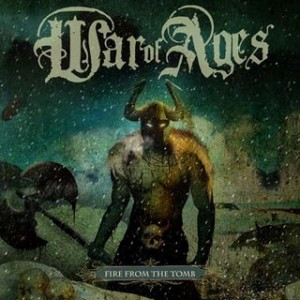 Originally released as their self-titled debut long-play record, the re-release of the album comes with a more polished and precise production job and an additional song (which would eventually be re-worked and re-recorded for their third album Arise and Conquer). It’s a remarkably strong debut as well, particularly with the benefit of hindsight, which set the band on an unerring and unwavering musical path that has seen them ignore and avoid the pitfalls of trend and tribulation.
Originally released as their self-titled debut long-play record, the re-release of the album comes with a more polished and precise production job and an additional song (which would eventually be re-worked and re-recorded for their third album Arise and Conquer). It’s a remarkably strong debut as well, particularly with the benefit of hindsight, which set the band on an unerring and unwavering musical path that has seen them ignore and avoid the pitfalls of trend and tribulation.
After a traditionally stompy metalcore intro track (you know the type – effective for all its predictability) the record kicks into motion with the weaving twin guitars of “Stand Your Ground”, all buzzing tremolo melodies and pounding breakdown attack. The vocals are delivered with admirable force and self-assurance while the drums crackle with palpable intensity. Despite the often formulaic nature of the composition, it still has a surprise or two in store, be it the unexpectedly melodic moments of shamelessly euro-centric guitar work or the inclusion of an impressive closing solo, which lifts the track firmly into more memorable realms.
“Brothers In Arms” has a clear and more riff-friendly aesthetic, its more direct and linear approach tying together impressively individual riff sequences into a coherent and surprisingly multi-faceted whole. The construction of the song is designed to promote an energetic and involuntary response from the listener, each and every riff grabbing the attention from the get-go, displaying the well-developed compositional abilities and skills for arrangement the group possessed even in these early days, matching some impressively heavy heft with some ultimately extremely memorable hooks.
Despite their almost excessive application, the lead guitars which dominate much of the proceedings often do so in an extremely tasteful and always effective manner. They remain perhaps the single greatest weapon in the WoA armoury, and shine exceptionally brightly on “The Awakening”, a song which would (deservedly) eventually be re-recorded for 2008’s Arise and Conquer, allowing its piercing melodic dynamism to shine even more brightly.
With “Only The Strong Survive”, we see the group spread their musical wings a little wider, with an extended opening of flamenco-tinged acoustic guitar adding flavour to the Gothen-core guitar clinic which follows, both guitarists really delving deeply into the origins of the style to produce some tasty morsels of riffage which, whilst not totally original, are well-constructed and welcome contributors to the riff-base of the song, rich with individual expression and fervour.
Surprisingly, this album actually features one of my favourite songs of all time, odd perhaps to say about an early metalcore release of this style but true, as “Battle On” strikes a real chord within me. The song’s message of pride and perseverance, the weaving tapped guitar melodies and THAT riff (you’ll know it when you hear it) provide an epic and glorious composition that flows fluidly and seamlessly from start to finish. The song’s stunning and drawn-out climax begins with a melancholy clean guitar melody picked out, which slowly reveals itself as a variant on the song’s brilliant main riff refrain, before transforming into a series of soaring, emotive lead parts and solos seemingly designed to lift the spirits.
The record ends with “Second Chance”, building from a haunting and hazy refrain of distant guitar chords ringing out with ethereal grace into a forceful number filled to bursting with water-tight tremolo lines, nimble-fingered melodic guitar runs and pounding drums whose vicious impact is felt and heard on a deeper, more primal level.
Pride Of The Wicked – 2006
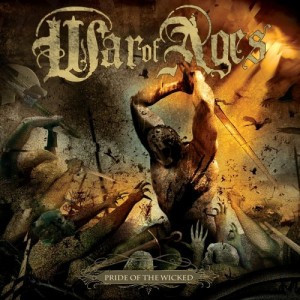 WoA’s second album maintains that single-minded drive and stubborn sense of purpose from their debut, but takes a step up in intensity and heaviness. I’d look to bands such as Heaven Shall Burn for a comparison of how tightly and carefully guided their sound is, wringing a wide palette of melodic tones and bruising belligerence from each of their instruments while remaining intensely focussed and uni-directional in intent. While the over-emotional vocals, both barked and spoken, may occasionally tip over the edge into Americanised melodrama, the group’s tendency to launch into apoplexies of virtuoso lead guitar with shameless and joyful abandon gives their sound a distinctly European edge.
WoA’s second album maintains that single-minded drive and stubborn sense of purpose from their debut, but takes a step up in intensity and heaviness. I’d look to bands such as Heaven Shall Burn for a comparison of how tightly and carefully guided their sound is, wringing a wide palette of melodic tones and bruising belligerence from each of their instruments while remaining intensely focussed and uni-directional in intent. While the over-emotional vocals, both barked and spoken, may occasionally tip over the edge into Americanised melodrama, the group’s tendency to launch into apoplexies of virtuoso lead guitar with shameless and joyful abandon gives their sound a distinctly European edge.
Taut and electric, “Guide For The Helpless” builds from silence into a raging storm of electrifying guitar with an interesting ascending/descending dynamic, whose thick and crushing tone showcases the newfound power of the band’s crystallising guitar work. Thankfully, the band retain their fearless penchant for layering each track with multiple soaring lead lines, weaving a variety of different melodic themes throughout the track to accent the heavier riffs, breaking into a twin-guitar harmony or a sweeping solo section at the drop of a hat.
“Strength Within” epitomises this power-metalcore sound the band have latched upon to call their own, its utterly heroic opening bars transitioning into a chugging, staccato riff over which are layered barked vocals and a sharp, precise drumming performance, with more and more striking lead guitar elements steadily working their way back into the mix before the introductory refrain leaps back into the fray. The bridge sees complex drum fills, emotive vocals and a sorrowful lead line set the stage for an ascendant solo, which moves into chuggier breakdown territory before ending on a catchy headbanger of a riff.
“Absence Of Fear” is, for all intents and purposes, what would be produced if the government ever commissioned a lab to weaponise metalcore. Yet what a well-made weapon it is, forged to perfection with only one function in mind. The beginning staccato chuggery leads seamlessly into some sharp and shining riff work while the kicks fly furiously and frantically beneath the barked and vital vocalisations. Even the expected breakdown section, with its “we will rise” vocal refrain, retains surprising effectiveness despite our well-developed immunity to such things, as it manifests as a slightly new strain of infectious metalcore stomp, overlain with weaving guitar runs and some breathtakingly belligerent vocals.
Parts of “The Fall Of Pride” are as oddly melodic as anything the band have produced, belying the song’s heavier, crunchy opening, while the mid-section moves back and forth between dark, down-picked intensity and uplifting whirlwind melody lines, the fret-board fireworks continuing throughout both its fiery and forceful solo and on into its mid-song escape into stratospheric, Steve Vai-esque guitar histrionics, right through to its closing bars of calm, flowing clean guitar work.
“Heart Of A Warrior” on the other hand treats its more complex and writhing guitar lines as almost an afterthought in amongst the anvil-heavy clanging of massive storm-front riffs and brooding, serpentine bass lines. With a smoky, battle-weary groove and a plethora of barbed hooks it firmly showcases the heavier and more barbarically aggressive side of the band’s musical arsenal, armour plated and ready for war.
As always, the band close with one of the album’s best cuts, the wiry and agile “Stone By Stone” , which sees the group shift between their more strident melodic tones and more off-kilter moments of clattering snare-drums and avalanches of thudding, obliquely patterned guitar work. The quiet and reflective bridge sees beautiful acoustic guitar work take centre stage while ringing electric chords hang ominously on the horizon. The song’s ending is a stunning display of heart-felt passion and deeply held conviction, expressive gang vocals chanting a mantra of strength and empowerment over a steady march of restrained yet powerful guitars.
Overall, this is actually in many ways the least expansive and most openly formulaic of WoA’s albums, and the one most focussed on the “heavy” side of their sound. More direct and aggressive than their debut, it definitely has its place in their discography, seeing the band concentrating on laying down a firm foundation of metallic vitriol in fertile and passion-infused soil, on which they can then build up layer and layer of effervescent melody and uplifting atmospherics. Indeed this approach, and all that they learned and developed here, allowed them much more freedom in the expression and exploration of the majestic and abstract use of melody that characterised the next two albums of their career.
Arise & Conquer – 2008
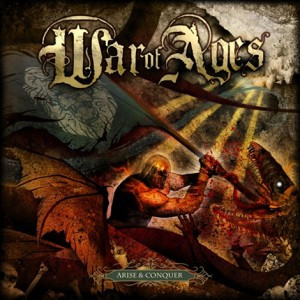 Once more building upon the foundation laid by its predecessor, Arise and Conquer continues the blistering energy and heavy intensity of Pride Of The Wicked, but manages to recall more of the youthful vibrancy and exuberance of Fire From The Tomb, crafting a selection of songs more complex and interesting than simple expectations may have suggested, with riffs and compositions that are less direct and less fundamentally predictable. The raw talent and exceptionally energetic playing presented on this album lift it head and shoulders above the majority of its less talented and less engaging peers.
Once more building upon the foundation laid by its predecessor, Arise and Conquer continues the blistering energy and heavy intensity of Pride Of The Wicked, but manages to recall more of the youthful vibrancy and exuberance of Fire From The Tomb, crafting a selection of songs more complex and interesting than simple expectations may have suggested, with riffs and compositions that are less direct and less fundamentally predictable. The raw talent and exceptionally energetic playing presented on this album lift it head and shoulders above the majority of its less talented and less engaging peers.
Opening with one of the record’s strongest cuts, “All Consuming Fire” kicks in with the anguished vocals and stuttering riffage that provides such a firm foundation for WoA’s sound, over which gorgeous, uplifting leads and spiralling solos swoop with angelic grace. Exceptionally cathartic and empowering, the song’s gut-level groove and huge, soaring melodies provide a perfect mix of passion and pathos.
“Through The Flames” marries its more metallic energy to a more punk-vibe and gang-like energy, particularly during the group-sung choruses which strike a clear balance between clean majesty and dirty, punky dynamism. The electric, almost playful, guitar work during the verses showcases a band with little regard for popularity or pretension, clearly enjoying the sheer energy and exuberance of their own performance and song-writing with little regard for the judgements of others.
“Salvation” kicks into gear with an impressively pyrotechnic and unashamedly 80’s solo which sets the stage for some great sturm und drang riffage that’s part spiky dynamism, part rolling groove. The drums lay down an impressive backbone of pounding kick-work and crackling snare strikes while the guitars strike a delicate balance between irrepressible metallic heft and fervent melodic expression.
Following a dark and foreboding beginning, “Wages Of Sin” sees the band rein in some of their more melodic tendencies to deliver some more angular and lead-heavy riffs accented by some pained and powerful screamed vocals. Some spiralling melody does peek its head through the clouds of swirling, dark riffage on occasion, and the song also features some unexpected digression into clean singing during the bridge, but overall the song retains a bruising and dark groove that serves to set it apart from the rest of the album somewhat.
Closer “The Deception Of Strongholds” sees the band play with their formula to a limited extent, progressing from an acoustically strummed beginning into a majestic solo backed by stately, martial chords and some scintillating drum work before the song’s main refrain riff kicks in with its sparkling and captivating melody. Never afraid to use a million notes where one would suffice, the band pack the song with multiple instances of soaring lead guitar and nimble, string-skipping riffage while the vocals roar and rage with convincing passion and force.
Eternal – 2010
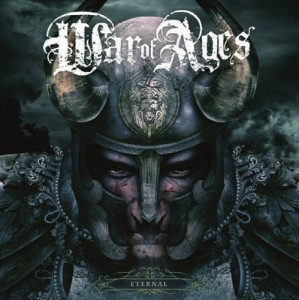 With Eternal, the group continue boldly along the path laid out for them by their previous records, finally incorporating some mellifluous clean singing into their musical palette, yet wisely sidestepping sell-out accusations by the natural and organic fashion in which these newly discovered cleans are used and applied. Indeed, the band have always been focussed on the melodic hooks, whether riff-flavoured or drawn from captivating melodic leads and solos, thus making the transition to clean vocal hooks feel ultimately like a natural progression, instead of an attempt to grasp at more mainstream acceptance.
With Eternal, the group continue boldly along the path laid out for them by their previous records, finally incorporating some mellifluous clean singing into their musical palette, yet wisely sidestepping sell-out accusations by the natural and organic fashion in which these newly discovered cleans are used and applied. Indeed, the band have always been focussed on the melodic hooks, whether riff-flavoured or drawn from captivating melodic leads and solos, thus making the transition to clean vocal hooks feel ultimately like a natural progression, instead of an attempt to grasp at more mainstream acceptance.
Vitally, the musical direction of the group remains unchanged and (thankfully) un-simplified by this new, and for many people off-putting, element. Indeed the fluid solos and majestic lead refrains which form the crux of the WoA sound are perhaps more prominent and powerful than ever, and although the group do still gravitate towards the simplistic in terms of their use of staccato breakdowns as transition points, their technical flair and compositional nous have both taken a real step up, exploring melodic textures far closer to European melodic death metal, and even power metal, then ever before. Granted, at times the stylistic similarity to As I Lay Dying is a little strong, but overall there’s a real progression in the use of audacious melody to lead the way on this album.
“Collapse” and “Desire” get the album off to a racing start. The former is an epic call to arms whose refreshingly vital take on the metalcore formula demonstrates just how important its integral energy is to its success, using a variety of fluid lead lines and soaring clean vocals to add to the dynamic of the track without sapping it of its fundamental energy. The latter is a shorter and overall heavier stormer of a track which features some more overtly aggressive moments, without neglecting the Euro-power metal elements which have filtered through over time, aided and abetted by growling vocal contributions from As I Lay Dying’s Tim Lambesis.
“My Resting Place” continues to build the uplifting, resilient atmosphere which serves the band so well as their raison d’etre, never afraid to employ an excessively emotive lead part or classically heavy metal progression whenever there’s even the slightest space for one. It also has a particularly effective and infectious mid-section where the drums are given free rein to speed and hammer away to their heart’s content over a great arrangement of stompy, crunch-laden riffage.
There’s another, more unexpected, guest vocalist who appears on Eternal whose name I am not going to spoil for you (although it’s easily google-able if you’re so inclined) as his performance far outweighs the negative stereotypes which might otherwise be attached to his name. The interplay of vocals is well executed and adds an interesting stylistic dynamic to the track, which is an irrepressibly upbeat and positive number that shines and soars with gleaming vitality in all its parts. Continuing the impression that being “heavy” is in many ways merely an incidental part of the WoA sound, the track’s striking use of melodic runs and multiple lead refrains demonstrates the sheer joy of melodic guitar work at its most unfettered and unashamed. The liquid soloing and sharp-toothed riffs a testament to what can be achieved with fluid fingers and a mind for melody.
By contrast, “The Fallen” demonstrates a slightly different take on the band’s signature sound. Fully several shades darker and more dissonant, it’s a heavier and more violent number that builds an oppressive atmosphere with its ominous chord progressions and dark harmonic refrains. The drumming is far more pummelling and aggressive, while the breakdown tease near the end pulls a neat double-bluff on the listener, switching into a rhythmic and powerful riff refrain without dropping into the expected staccato crunch.
It seems to be the case that what truly sets War Of Ages apart is their conviction; conviction evident both in their passionate lyrical delivery and frenetic guitar playing, and in their perseverance in exploiting a sound which could, by many, be written off immediately as played-out and/or formulaic. To my mind (and indeed, my ears), though, WoA have found a formula that fundamentally works, where sparks fly from electrified fret boards as punchy drums and gripping vocals crash into the listener with stunning force. While the wheel may not have been reinvented, it has certainly been refined.
